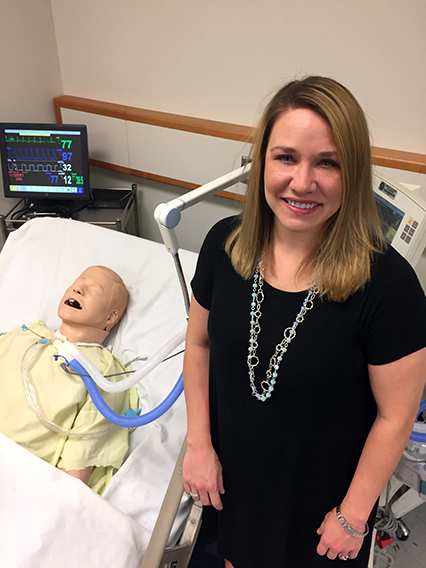
The 2014 AARC Human Resources Survey identified that 49 percent of program directors and 28 percent of directors of clinical education were planning to retire from respiratory education by 2024. This raises the question: Who will fill these positions as these established educators and others reach retirement age?
AARC member Hannah Beriault, MPH, RRT, assistant professor and director of clinical education at Augusta University (formerly known as Georgia Regents University and the Medical College of Georgia) has already stepped up. She explains how she did it in this Q&A.
When and why did you decide to become a respiratory therapist and where did you get your RT degree?
I applied for respiratory therapy school at the Medical College of Georgia and was able to shadow a therapist, who was also a faculty member. I shadowed him in the Trauma ICU, and the intensity of the environment was incredible. The physicians looked to the RTs to make decisions, and I fell in love with RT. I graduated RT school from the Medical College of Georgia in 2005.
How long did you work as a traditional RT and what did you most like about that role?
I worked at the Medical College of Georgia immediately after graduation, and was a full time therapist for eight years. During the last three years, I became a clinical specialist for the RT program at Augusta University, where I precepted RT students to the general floor unit and intensive care units.
How did you first get involved in RT education and what was it about that role that led you to want to become a faculty member in an RT program?
I began doing small presentations on mechanical ventilation and arterial blood gases to the surgery residents and emergency medicine nurses because there was a need to re-educate. So, I prepared PowerPoints that simplified the material to an understandable manner. It was then that I decided that I wanted more for my RT career. I started school and finished my MPH in epidemiology in 2010.
What did it take to acquire your position as an RT educator there at Augusta?
After years of dedicated work in the intensive care units, the ED, and floors, I was afforded other educational opportunities with peers, and this allowed me to pursue a full time educator position at my alma mater, which really was a dream come true. When I was a student, our program was very challenging and our professors demanded excellence, which pushed us to stand out amongst our peers. I knew one day that I wanted to be a teacher in our program, to continue the tradition of high quality RT education.
What does your current job entail?
Currently, I’m the director of clinical education and I teach many courses, such as Diagnostic Testing — ABGs, bronchs, etCO2, etc. — Advanced Mechanical Ventilation, Pharmacology, Advanced Mechanical Ventilation Lab, and Fundamentals of Respiratory Care Labs, among other clinical courses. I still go with my students to the general floor care and the intensive care unit rotations.
I really do have the best of both worlds. I’m able to keep my clinical skills; teach and evaluate my students; teach lab, class, and clinic; and stay up-to-date on new and innovative respiratory care therapies and technologies. In addition, I teach BLS for our students, and our program was the first to be involved in the Interdisciplinary Simulation Center with the Medical College of Georgia’s emergency medicine residents. Since its inception, nursing and pharmacy students have joined us for a complete interdisciplinary simulation.
What are the biggest challenges and the biggest rewards you’ve faced on the job so far?
The biggest challenge is understanding how each student learns, especially when I’m explaining the same thing, four different ways. I’m always busy, either communicating with all the clinical affiliates, going to 12.5 hour clinics, or teaching class or lab.
Balancing professional and home life is a challenge, but as I’ve matured in my position, it’s definitely better. The biggest and most amazing reward possible is to have my students begin school, see them mature in the field, then graduate and they become my peers. When I go to clinic with students, it is such a joy to see so many of our graduates working, and the best thing is to work with them. It’s such an exciting time to see them in action!
What advice do you have for other RTs who might see themselves going into RT education?
The first thing I’d tell someone is to start small. Make sure that you enjoy teaching and the preparation that is involved. You have to be passionate and knowledgeable about what the evidence suggests! You need to read articles on evidence-based medicine, because so much of an educator’s job is not just teaching, it is preparing students to be good evaluators of new therapies or new strategies that RTs use in the hospital or at home.
What do they need to do to prepare for such a role, and what types of things should they consider before seeking one out?
You need to obtain your master’s degree, but definitely choose something that is interesting and challenging to you and that you could use in your potential job. If your master’s degree is education focused, you can then use it to better how you teach. My master’s degree isn’t in education, but I love public health, and especially epidemiology!
How do you think your AARC membership helped you diversify into this new role?
The AARC has a wealth of knowledge available to working therapists as well as educators. If I have a question about something in our program, I immediately go to the Education Section and either ask or search. What I’ve found is that most people just want to help each other, so don’t be afraid to ask.
Think you’d like to be an RT educator? Get a taste for the area via the Education Track in the AARC’s Leadership Institute.





